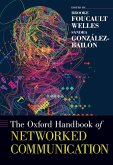Communication technologies, including the internet, social media, and countless online applications create the infrastructure and interface through which many of our interactions take place today. This form of networked communication creates new questions about how we establish relationships, engage in public, build a sense of identity, and delimit the private domain. The ubiquitous adoption of new technologies has also produced, as a byproduct, new ways of observing the world: many of our interactions now leave a digital trail that, if followed, can help us unravel the rhythms of social life and the complexity of the world we inhabit--and thus help us reconstruct the logic of social order and change. The analysis of digital data requires partnerships across disciplinary boundaries that--although on the rise--are still uncommon. Social scientists and computer scientists have never been closer in their goals of trying to understand communication dynamics, but there are not many venues where they can engage in an open exchange of methods and theoretical insights. This handbook brings together scholars across the social and technological sciences to lay the foundations of communication research in the networked age, and to provide a canon of how research should be conducted in the digital era. The contributors highlight the main theories currently guiding their research in digital communication, and discuss state-of-the-art methodological tools, including automated text analysis, the analysis of networks, and the use of natural experiments in virtual environments. Following a general introduction, the handbook covers network and information flow, communication and organizational dynamics, interactions and social capital, mobility and space, political communication and behavior, and the ethics of digital research.
Dieser Download kann aus rechtlichen Gründen nur mit Rechnungsadresse in A, B, BG, CY, CZ, D, DK, EW, E, FIN, F, GR, HR, H, IRL, I, LT, L, LR, M, NL, PL, P, R, S, SLO, SK ausgeliefert werden.









